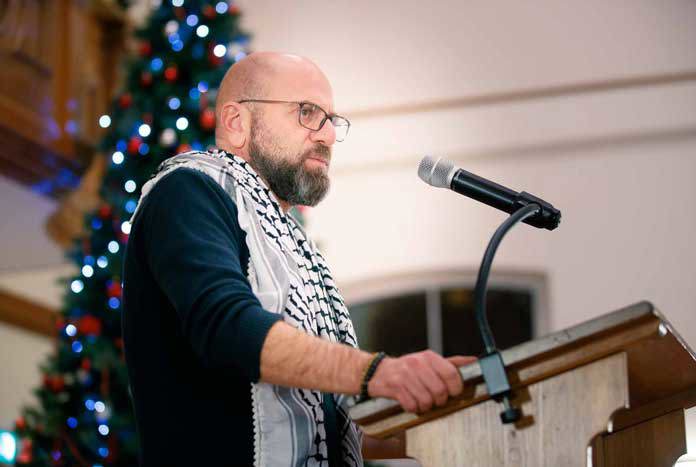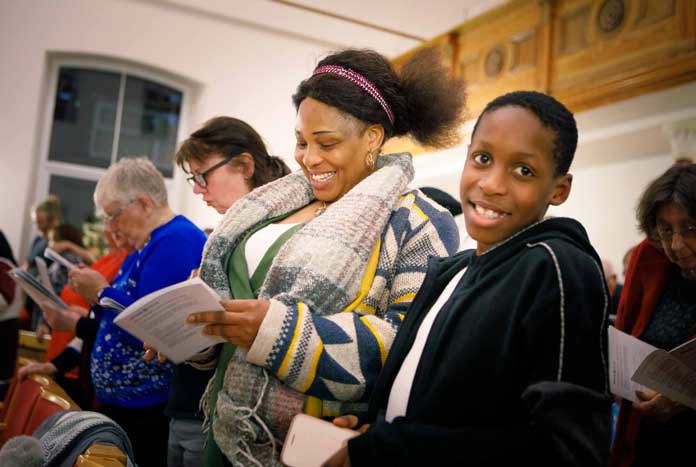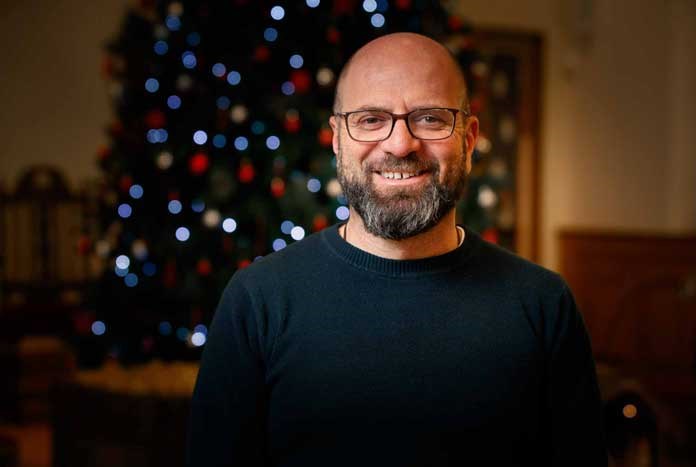“Yes, we are living in darkness these days and it is not just in Palestine. It is everywhere. It is time for us to stop blaming the darkness for being too dark and start looking for the light that is fully present in each one of us and that light will shine only when we do what we are called to do.” Sami Awad from Bethlehem shares his thoughts at Advent.
“The situation is dark and getting darker by the day. Where is the light in such darkness? Maybe, just maybe, as we prepare to celebrate the birth of Jesus, we can remember that the light is there.” Sami Awad — Holy Land Trust, Bethlehem
He came to be a model
When talking to Palestinians today, one common phrase you will hear is this: “it is getting worse.” If you have visited Palestinian areas and met the people here, you will feel the heaviness of it. Most people have become hopeless, resigned, and apathetic.
The situation is dark and getting darker by the day. Where is the light in such darkness? Maybe, just maybe, as we prepare to celebrate the birth of Jesus, we can remember that the light is there.
Jesus was born in a similar situation over two thousand years ago. Rome was occupying the land with an iron fist and no mercy. Herod was deeply corrupt and violent, he killed his wife and own sons. It was a time of hopelessness and doubt, fear and darkness.
In such time, do you ever wonder why Jesus was born a baby? A few kilometres away from where he was born and maybe within a few hours, the glories of the heavens opened up and choirs of angels came ascending on the shepherds proclaiming his birth. Could he have not just come down in the midst of this miraculous experience and landed on earth and proclaimed himself as the awaited Messiah and all violence and terror would have ended?
The situation is dark and getting darker by the day. Where is the light in such darkness? Maybe, just maybe, as we prepare to celebrate the birth of Jesus, we can remember that the light is there.
The Shepherds and thousands, if not millions who would have seen or heard of such an arrival would have immediately believed in him right then and there and life would be different even today.
Why was he born to a poor and marginalised family, to a young woman who most would not have known she even existed? Could he have not been born in a family with more influence and clout, more mainstream, more accepted in the social fabric of his time, maybe even more affluent in the political and social circles of the day?

Sami Awad from Holy Land Trust in Bethlehem, speaking in West Yorkshire, England — December 2019
When he grew up, why did he do the things he did? Struggling with his followers, walking long miles from place to place, preaching in synagogues, hardly having a place to rest for a good night sleep, socialising with people of zero influence and healing them?
As the Messiah, could he have not just done two or three major magnificent miracles early on that were so global in their reach and witnessed not by thousands but by millions, that would have been enough for people to believe in him and follow him?
If he was just about having people and nations believe in him as the saviour, he could have done it from the start in a much easier way with greater outreach and without a doubt, much better results.
So why did he go through all that?
I believe he came as a child in the midst of one of the darkest times in Palestine because he wanted to show us that light of hope in hopelessness in times of violence and despair will only come from those who are the most fragile, vulnerable, marginalised, helpless and neglected. It will not come from the powerful, the affluent, the mighty, or anyone who presents themselves as powerful and knowing.
As the Messiah, could he have not just done two or three major magnificent miracles early on that were so global in their reach and witnessed not by thousands but by millions, that would have been enough for people to believe in him and follow him?
Today, like then, the world is looking towards those in power and influence for “salvation” and for the light of hope. Jesus is telling us, we are looking in the wrong place.
So why did he then go through all that he went through after he grew up and not just do one or two things to bring humanity to believe in him and be saved right there and then? I believe that he did that to be a model for us as to how we are to live our lives. I believe that was his main mission.
For the last 2000 years the church has put so much of its focus and energy on personal salvation and not on the radical good news Jesus lived. It has focussed on his death and resurrection and viewed the rest of the gospels as being of little more use than to be good for teaching children and for use as sermon illustrations.

The congregation at the Amos Trust Bethlehem Advent Carol Service in Normanton, West Yorkshire — December 2019
So what did Jesus do as a model for us to follow? What did he give us permission to do as his followers?
- He turned over the tables of financially greedy and capitalists. He challenged those who were exploiting the poor and selling them lies and deceiving them. Why did he do that? He did that to be a model for us and to give us permission to do the same. We are called to turn the tables over of those who are greedy and corrupt, those who exploit others for their own gain.
- He broke the law on Shabat, he told his disciples that it was OK to harvest the grain on this day to eat and he healed the sick. Now breaking the law of Shabbat is one of the most desecrated acts you could do, so why did he do that? He did that to model for us and give us permission to do the same. Laws and policies that are unjust and violate basic human rights must be challenged, broken, and resisted even if they become the norm.
- He defended the woman who was about to get stoned by a mob of men. Why did he do that? He did that to give a model for us and give us permission to do the same. To stand strong against those who commit violence against women and those whose gender or sexuality we judge. To stand between those who are violent and those who are being violated, to protect them, defend them and take the beating if necessary.
- He used water and mud to heal. He could have done it without these elements so why did he do that? To model for us respect to all forms of creation. To honour the healing power in all that God created, in nature itself.
- He met with his alleged “enemy,” the Romans, the Samaritans, the Canaanites. Why did he do that? To be a model for us and to give us permission to do the same. He did not only meet with them, he engaged with them, he listened to them, he healed them, he loved them. How many of us are really ready to cross that line into enemy territory and do the same, not only meet, but to fully love those we have labeled as enemies or have labelled us as their enemy?
- When he stood for what he believed in, he was insulted, attacked, cursed, ridiculed, spat on, beaten, tortured, and even killed. He challenged those in power even in the core of their teachings and theology. He would have been labeled as a “self-hating Jew” if that term was coined at that time. Why did he do that? To be a model and to give us permission to do the same. To stand for justice and equal rights without fear of being attacked or criticised by those who hold power as being racist.
As a Palestinian, it brings me great sadness to see the global campaign to undermine those who are truly standing for peace and justice in the Holy Land being labeled as antisemitic. In no way, do I deny the existing and growing anti-Jewish sentiment around the world (which is also happening to many other minority groups). But to stand for justice for the Palestinian people and to declare that criticism of the Israeli occupation is antisemitic is not just wrong, I actually believe it is antisemitic itself.
To allow Israelis and Palestinians to remain in this vicious circle of violence and hatred without putting the necessary pressure on the oppressor to end the oppression is a choice to be anti-Israeli and anti-Palestinian and does nothing to promote the well being of Jews in the land or in the diaspora.
He met with his alleged “enemy,” the Romans, the Samaritans, the Canaanites. Why did he do that? To be a model for us and to give us permission to do the same.
Has the church become complacent?
Has the church become lazy in its comfort and status of privilege?
Has the church become a slave to the systems of oppression and manipulation Jesus calls us and orders us to resist?
Have we become what he rejected?
We are called to follow him, not just to believe in him. We have taken the easy way out of our responsibilities for this world and everything and everyone that is in it.
Yes, we are living in darkness these days and it is not just in Palestine. It is everywhere. It is time for us to stop blaming the darkness for being too dark and start looking for the light that is fully present in each one of us and that light will shine only when we do what we are called to do.
— — — — — — —
Please sign up to receive Amos Trust’s E-news which will keep you updated about our work in Palestine, our On Her Terms campaign for girls and young women on the streets and our Climate Justice work in Nicaragua.


















